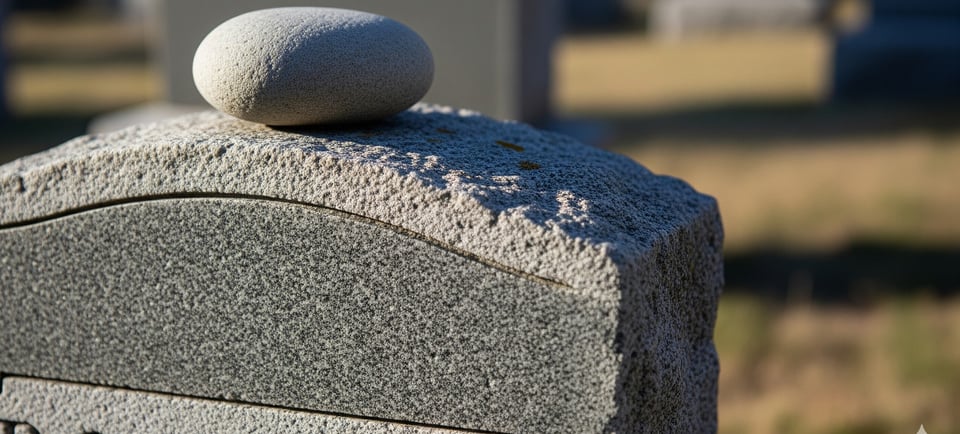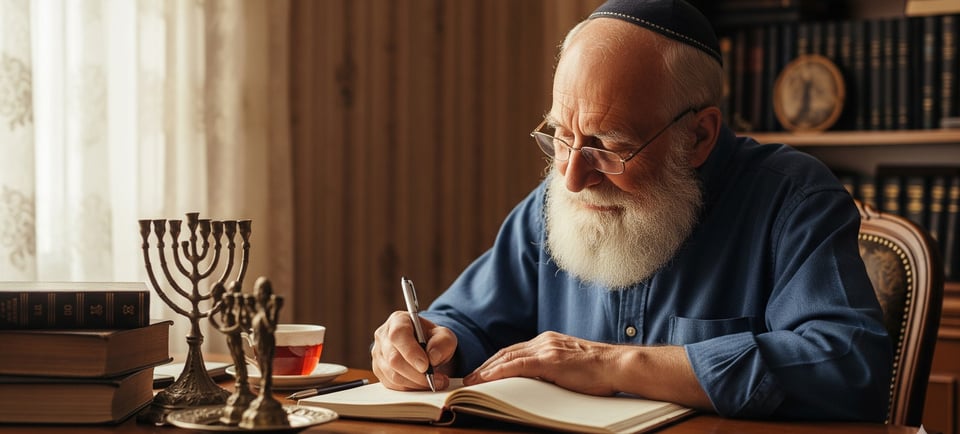Jewish Mourning: Why Graves are Adorned with Stones, Not Bouquets
Curious about the Jewish tradition of leaving stones on a gravesite instead of flowers? This practice is rooted in a focus on enduring legacy and the profound principle of simplicity and equality in death. Learn the powerful meaning behind this ancient custom, which honors a person's life and soul rather than their earthly status.
9/3/20255 min read


Have you ever strolled through a cemetery, noticed the beautifully manicured plots, and then, you know, spotted a Jewish gravesite with a pile of rocks instead of a vibrant bouquet? It's a sight that can make you pause and wonder, "What's the story there?" Honestly, it's a question I've heard a lot. While flowers are a heartfelt way to express sympathy and decorate a final resting place in many cultures, the Jewish tradition takes a different, incredibly meaningful path.
Let’s be real for a second. We’ve all seen the dramatic funeral scenes in movies—the sweeping floral arrangements, the perfectly-arranged wreaths. They’re a symbol of respect, a visual balm for grieving hearts. But in Judaism, the focus isn’t on temporary, fleeting beauty. It’s on something far more enduring. It's about a lasting impact, an everlasting legacy that outlives any single moment, any single blossom.
This is where the concept of simplicity comes in. The whole Jewish mourning process, from the burial itself to the weeks and months that follow, is rooted in the idea that all human beings, rich or poor, are equal in death. It's why Jewish law requires a simple, unadorned wooden casket and a plain white shroud. By doing so, you remove any sign of earthly status. A millionaire and a day laborer are laid to rest with the same dignity and humility. Flowers, with their potential for extravagant displays, could easily disrupt this fundamental principle. They can become a competition of who can show the most, which, you know, completely misses the point. The burial and the grave are meant to be a testament to a person's soul, not a showcase of wealth.
So, if not flowers, what gives?


The Enduring Symbolism of a Single Stone
Here's the thing about stones: they are eternal. They don't wilt, they don't fade, and they don't die. They are a tangible representation of permanence. When you visit a grave in a Jewish cemetery and place a small stone on the headstone, you are not just leaving a marker; you're participating in an ancient, beautiful tradition. Every single stone placed by every visitor becomes a permanent part of the monument. It's a way of saying, "I was here. I remembered you, and a part of my memory and love is now physically and forever tied to your resting place." This act adds to the tribute, building up the memorial in a quiet, collective way.
Think of it like this: a person’s body, much like a flower, is temporary. It’s here, it blossoms, and then it's gone. But the soul? The neshama? That's the eternal part. It's the part that, like a stone, lives on forever. In the world of truth, which is what Jewish tradition calls the afterlife, what truly counts is the lasting impact you had on this world. The kindness you showed, the good deeds you performed (mitzvot), the light you brought to others—these are the real, eternal stones you leave behind. They're not transient displays; they are the bedrock of your spiritual legacy. It’s a powerful metaphor, isn’t it? The money you might have spent on a perishable bouquet could instead be used for tzedakah—charity—which is a good deed that honors the deceased's memory in a way that truly lasts.


FAQs on Jewish Mourning
Why is it called "sitting shiva," and what is it?
Ah, great question. The word shiva literally means “seven” in Hebrew. It refers to the seven-day period of mourning immediately following the funeral. During shiva, the immediate family typically stays at their home, and friends, family, and community members visit them to offer comfort and support. It’s a time for communal prayer and for the mourners to focus on their grief without the distractions of daily life. Visitors often bring food—not flowers—to help the family, showing their support in a very practical way.
So, flowers are never, ever okay? What if the person loved them?
It's an interesting point and one that has come up in modern times. While the custom is to avoid flowers, it's not a strict halakhic (Jewish law) prohibition. However, for most Jews, it's a deeply ingrained tradition. The practice is so universal that seeing a Jewish grave with flowers is jarring and often seen as a sign of unfamiliarity with the customs. There might be some very rare, personal exceptions, but as a rule of thumb, it's best to respect the tradition and use a different means to show your love and remembrance.
I’ve heard that a person's soul stays near the grave. Is that true?
That's a popular belief, and it’s one of the reasons behind the tradition of placing stones. Some traditions hold that the soul remains at the grave for a period of time. By placing a stone, you are essentially "weighing down" the soul, helping it to stay where it belongs. It’s a poetic, almost mystical, thought that connects the physical act with a deeply spiritual purpose.


Jewish Mourning: The Purpose of a Visit
When we visit a grave, whether Jewish or not, we’re there to remember the person, not to tend to the physical decorations. The act of placing a stone is a subtle, yet profound, way to do just that. It's a physical reminder of our presence and a symbolic link between the living and the deceased. There’s a certain intimacy to it. You pick up a stone, you hold it for a moment, and you place it with intention. There are no fancy bouquets or fleeting petals, just a simple, unyielding stone—a powerful testament to a love that, like the stone itself, is meant to last forever.
So next time you're at a cemetery and you see a simple headstone with a scattering of pebbles on top, you'll know the beautiful, spiritual reason behind it. It's not a lack of caring; it's an abundance of a different kind. It’s the celebration of a life well-lived through the things that truly matter: good deeds, an everlasting soul, and a memory that can't be washed away by the rain.
